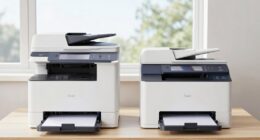Keeping proper records for your small business taxes is vital to stay organized and guarantee you claim all eligible deductions. You should document every expense with receipts, invoices, and bank statements, using digital tools if possible. Keep accurate payroll records and maintain separate accounts for personal and business finances. Regularly reconcile your accounts and update your records to prevent errors or surprises during tax season. If you want to know how to make this process easier, keep exploring these tips.
Key Takeaways
- Document all business expenses with receipts, invoices, and digital records for accurate deductions.
- Keep detailed payroll records, including wages, taxes, and hours worked, to ensure compliance.
- Maintain separate bank accounts for personal and business finances to simplify tracking.
- Regularly reconcile bank statements and update records to prevent errors and backlog.
- Organize financial documentation systematically to facilitate tax filing and audit readiness.

Are you keeping the right records to guarantee your small business taxes are accurate and stress-free? Proper record-keeping is essential to avoid surprises during tax season and to ensure you’re claiming all eligible deductions. One of the most critical aspects is expense tracking. You need to meticulously document every business-related expense, from office supplies to travel costs. Use clear, organized records—receipts, invoices, and bank statements—to back up your claims. Digital tools or apps can simplify this process, automatically categorizing expenses and reducing the risk of missing deductions. Consistent expense tracking helps you stay on top of your finances throughout the year, making tax time less overwhelming and ensuring you’re not leaving money on the table. Maintaining detailed records also helps you distinguish between business and personal expenses, which is essential for accurate tax reporting.
Payroll management is another vital element of maintaining proper records. If you have employees or even independent contractors, keeping accurate payroll records isn’t just a good practice; it’s a legal obligation. Document wages paid, tax withholdings, benefit contributions, and overtime hours precisely. Proper payroll management ensures you’re compliant with tax laws and helps you prepare accurate W-2s and 1099s at year-end. It also minimizes errors that could trigger audits or penalties. Using payroll software can streamline this process, automatically calculating withholdings and generating reports needed for tax filings. When your payroll records are thorough, you can easily verify payments, deductions, and tax liabilities, which simplifies everything when it’s time to file. Staying organized with payroll documentation is especially important for ensuring compliance with tax regulations.
Good record-keeping also means maintaining organized files for your business income and expenses. Separate personal and business accounts, and regularly reconcile your bank statements. This habit helps catch discrepancies early and provides a clear financial picture. Be diligent about updating your records weekly or monthly to prevent backlog and confusion. With accurate expense tracking, you’ll know exactly where your money is going, making it easier to prepare financial statements and tax returns. Similarly, comprehensive payroll management records can prevent issues with tax agencies and ensure your employees are paid correctly and on time.
Frequently Asked Questions
How Long Should I Keep My Business Records?
You should keep your business records for at least seven years, as this aligns with typical record retention policies and tax audit preparedness. Staying organized helps you quickly respond to inquiries and avoid penalties. Regularly review and securely store records like receipts, invoices, and financial statements. If your business faces specific legal or tax issues, consider extending the retention period to make sure you’re fully prepared for any tax audit or audit-related questions.
What Digital Tools Can Help With Record-Keeping?
When it comes to record-keeping, digital apps and cloud storage are your best friends. They help you organize, store, and access your business records securely from anywhere. Apps like QuickBooks, Wave, or Xero streamline invoicing and expense tracking, while cloud services like Dropbox or Google Drive guarantee your files are backed up and easy to share. Using these tools keeps your records accurate, accessible, and safe, simplifying your tax prep process.
Are Receipts Necessary for All Business Expenses?
Receipts are essential for all business expenses, including receipts for meals, to substantiate your deductions. You should keep digital copies of these receipts using digital storage methods like apps or cloud services, making it easier to organize and access them later. This guarantees you have proper documentation during tax time, helping you avoid potential audits or questions from the IRS. Always store receipts securely and back them up regularly.
How Should I Organize My Financial Documents?
To stay on top of your finances, you should establish a system for expense tracking and financial organization. Use folders or digital tools to categorize receipts, invoices, and bank statements by month or expense type. Regularly update your records to guarantee accuracy and ease during tax season. This proactive approach helps you monitor cash flow, identify deductions, and maintain clear financial records, making your business more efficient and compliant.
What Are Common Mistakes in Record-Keeping?
Like a leaky boat, poor record-keeping sinks your business. Common mistakes include neglecting accurate inventory management and missing payroll documentation. You might forget to update records regularly or misclassify expenses, which causes confusion at tax time. Always double-check your entries, stay organized, and keep receipts and invoices. By avoiding these mistakes, you guarantee smoother financial tracking and better readiness for audits or tax filings.
Conclusion
Keeping proper records isn’t just about staying organized; it can save you an average of $2,200 during tax season. Accurate documentation guarantees you claim every deduction you’re entitled to and helps you avoid costly audits. Remember, nearly 60% of small businesses face penalties for poor recordkeeping. By maintaining clear, detailed records, you’re setting yourself up for smoother tax filing and greater financial success. Stay diligent—your future self will thank you.









